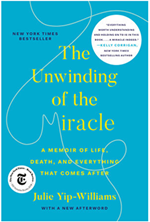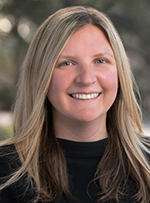 The Unwinding of the Miracle: A Memoir of Life, Death, and Everything That Comes After
The Unwinding of the Miracle: A Memoir of Life, Death, and Everything That Comes After
By Julie Yip-Williams
ISBN-13: 978-0525511359
Review by Amy Colver, LCSW
When I read the title of this book, I started thinking about the word “miracle” and ways that it has been a part of my life. I realized that I have heard the word primarily from patients and their loved ones throughout my career as an oncology social worker. My work has allowed me to hear different meanings of the word, in a variety of contexts, through individual lenses, but all within the common experience of facing a cancer diagnosis. Since I have always loved hearing others’ stories, I found myself wanting to know more about what the “unwinding of a miracle” meant to Julie Yip-Williams. So, I dived into her book without any hesitation. I am grateful that I did.
The Unwinding of the Miracle is the poignant memoir of a young woman who is diagnosed with metastatic colon cancer at age 37. At the time of her diagnosis, Julie was residing in Brooklyn, New York, with the love of her life and their two young daughters. She was working as an attorney at a prominent firm, engaged in raising her family and feeling vibrant in many areas of her life, including her health, writing that she was in the “best physical shape” of her life when she received her diagnosis.
Julie starts her memoir by describing the adversity, even death, that she faced at a young age. She was the youngest of three children, born blind into a Chinese family, in Vietnam less than a year after the war. Though Julie’s parents were excited to raise their third child, her grandmother viewed her as “broken” because of her blindness. For the earlier part of Julie’s life, her grandmother repeatedly verbalized her feelings that Julie would be a burden to their family and not able to accomplish the things that she should, based on familial and cultural expectations. These difficult aspects of Julie’s past are gracefully woven into her present situation.
While writing about her past and present, Julie also weaves in the many ways that she overcame adversity and experienced more than she and her family anticipated as a person with limited sight. She reflects on several profound occurrences in her life, including her family’s immigration to the United States when she was three years old, being raised in Los Angeles within an immigrant family, undergoing eye surgery as a child, feeling the fierce love from her parents and eventually her grandmother, being bullied in school due to her sight impairment, feeling grief due to not having the same experiences as other people her age, moving to Massachusetts to attend college, completing her law degree, traveling internationally on several solo trips, meeting and marrying the love of her life, raising a family, obtaining her dream job, and receiving her terminal diagnosis. Her descriptions of these experiences are beautifully intertwined into Julie’s present situation; living what remains of her life with as much normalcy, intention, love and meaning as possible while also facing her death.
Because of Julie’s life experiences, she refers to herself as a “non-numbers” person. She attributes her unbelief in numbers (or statistics) to all of the odds that she has already overcome in her life. Julie describes her husband as the “numbers” person in their relationship. We see their dynamic play out throughout the book, mainly when it comes to the medical details of her cancer diagnosis. The ups and downs of her illness left me feeling like I was on an emotional rollercoaster alongside her and her husband. From the beginning of the book, Julie shares that her husband is a private person, therefore, she does not share the intimate details of their relationship. However, she does give glimpses into their lives, mainly through sharing her perspective on their relationship and processing the wide range of emotions she is experiencing in knowing she will leave her husband through death. One apparent aspect of Julie and her husband’s story is their deep love for each other as well as their daughters. Julie’s relationship with her daughters is one of the most touching parts of her memoir. She describes the many ways they evolve and grow throughout the five-year course of her illness, while candidly processing the repeated moments where she realizes that she will not watch her children grow up. Simply put, I found it painful to read. At the same time, I found myself admiring Julie for her courage and thoughtfulness in preparing her children (and her husband) as much as possible for their lives after her death.
Julie also writes a great deal about the other people in her life who have supported her – her parents, siblings, many friends, healthcare providers, and people she meets through the colon cancer community. She also writes about her relationship with God. All of these relationships have a common theme; they evolve into a deeper connection than she ever imagined. Julie writes about doubting that she would have ever had these genuinely meaningful relationships without her cancer diagnosis.
Julie has an extraordinary way with words, from her first to her last. At the end of each chapter, I found myself eagerly wanting to know what was coming next while also processing the significance of what I just read. She writes with admirable vulnerability, honesty and courage, sharing every beautiful, heart-wrenching detail of living with a metastatic cancer diagnosis on a daily basis. She writes with the utmost love for the people in her life; respecting what is sacred in her relationships while openly reflecting on the impact of her diagnosis on each person. She refers to her story as one of “love between her and those who came to support me,” at every step of her journey. Additionally, Julie shares sobering advice and perspective about living life to the fullest; something she shares that she gained because of her cancer diagnosis.
There are so many other things in the book that touched my heart. Julie writes about things she has come to appreciate, what she has grieved, ways she has been challenged and strengthened, ways she has felt defeated and hopeless, things she has been able to do, things she will never do, the push and pull between wanting to live and wanting to die peacefully, the desire to hide while also needing to be present. There is not one part of her life that feels like it is missing in this memoir. Her writing is driven by her desire for her family, mainly her husband and daughters, to know her, both before and during her illness, and most importantly, for them to know how much she loved them.
Toward the end of the book, Julie describes what the “unwinding of the miracle” means. I recommend that you read her memoir to get the full description, but I will share that she feels life itself, including hers, is a miracle, and the unwinding, or death, is painful and beautiful at the same time. Julie writes, “I want to be remembered as a courageous person, one who, instead of running from cancer and death and begging for my life like a wild, crazed animal, stood there and stared them down, all the while acknowledging and embracing the reality and my fear, anger, and sadness, a stance reflective of an aspirational inner strength, dignity, grace, and beauty.” Julie is everything in this quote, and more. I hope you have the opportunity to read her memoir, and that it touches in your life in the ways that Julie and her family hoped it would.

